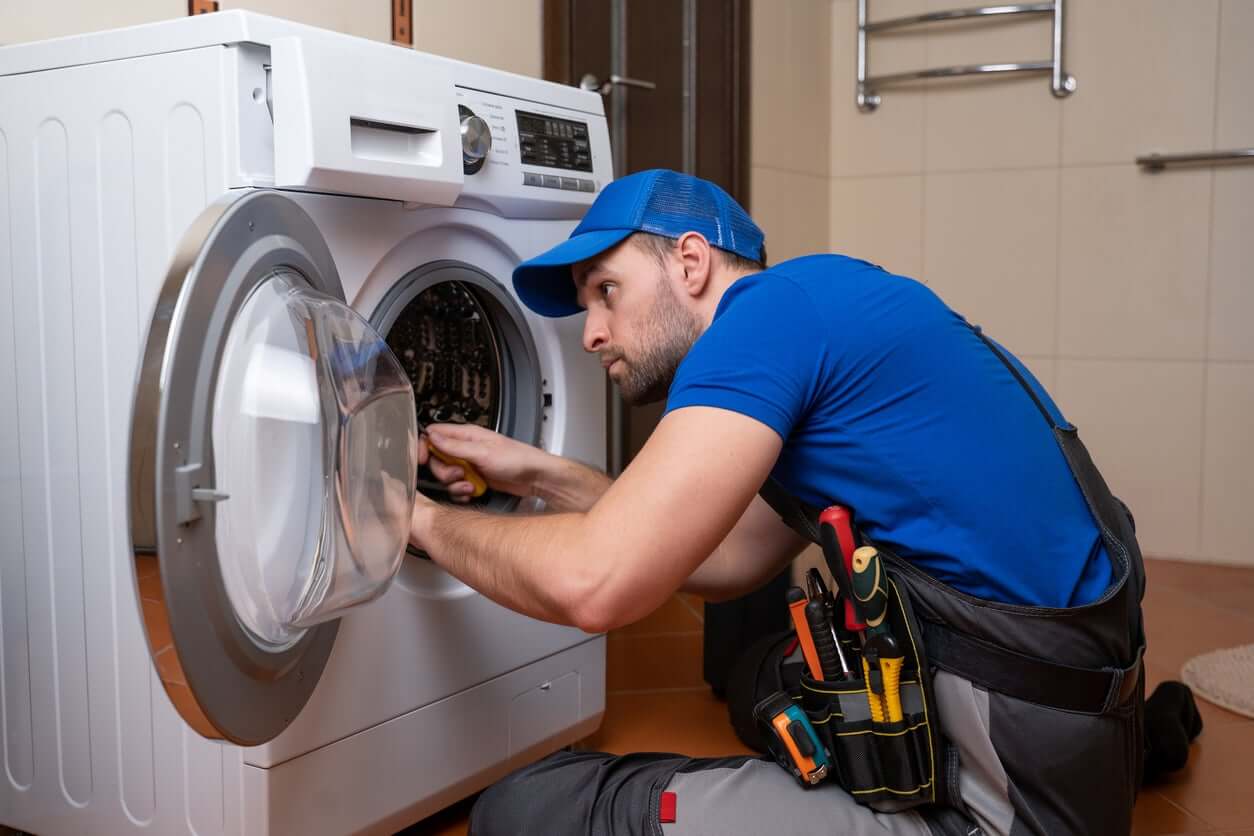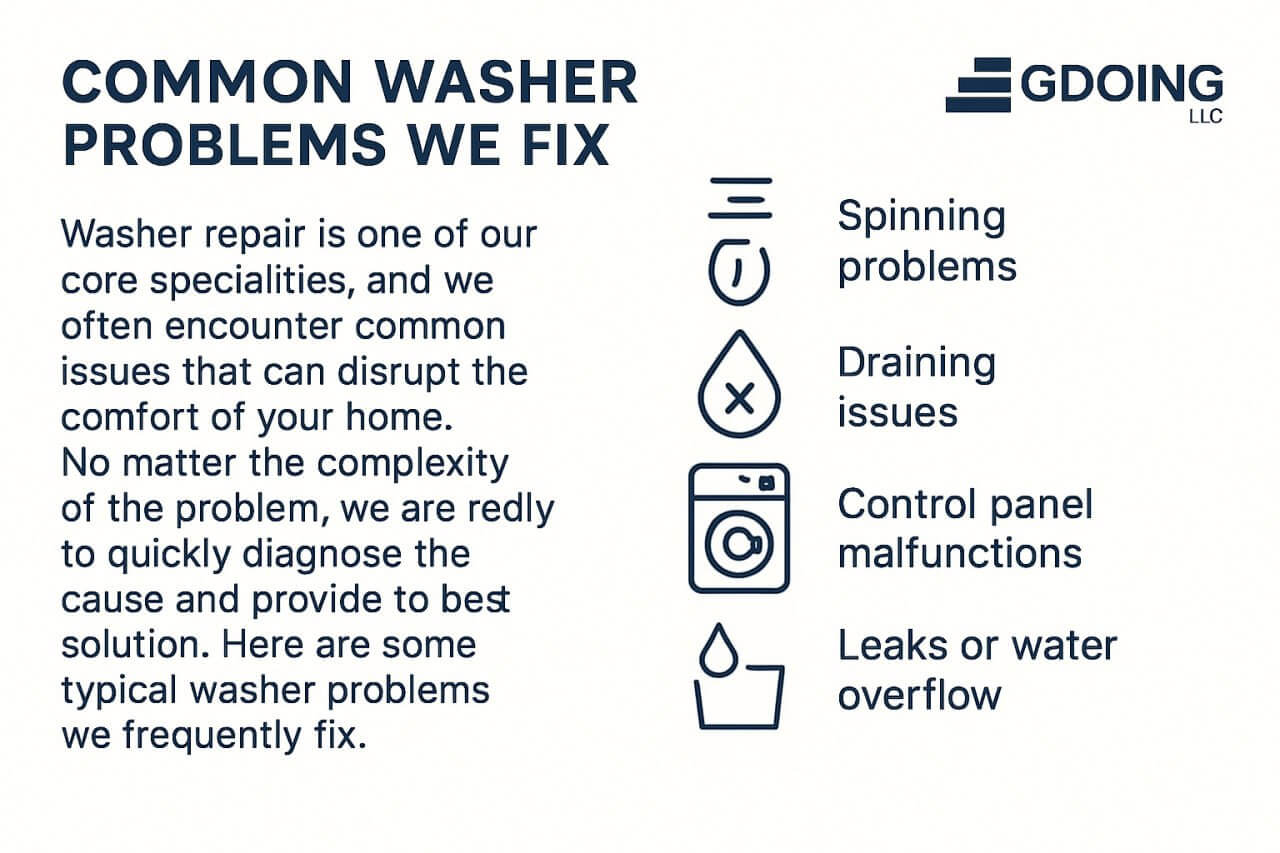A reliable washing machine is essential to keep your household running smoothly. But when your appliance starts making unusual noises, it’s often an early sign of washing machine problems. Whether your washing machine makes noise like a soft hum or a loud bang, these sounds usually mean it’s trying to alert you to an issue.
In this article, we’ll help you understand why your washing machine is making noise, what those sounds indicate, and when to call a professional for help. By knowing what to listen for, you can prevent costly repairs and keep your washer running efficiently.
Common Washing Machine Noises and What They Mean
Not all noises from your washer are created equal. Recognizing what each sound means can help you decide when to troubleshoot on your own and when to get expert help.
Grinding Noise
If your washing machine is making grinding noise, it’s often a sign of worn bearings, a foreign object stuck inside the drum, or a malfunctioning motor. This grinding sound usually points to a mechanical issue that shouldn’t be ignored.
When you hear grinding, stop using your machine immediately and contact a technician. Continuing to run it can cause further damage and increase repair costs.
Squeaking Noise
A washing machine making squeaking noise often means worn or dry parts like the drive belt, shock absorbers, or rubber seals. A high-pitched squeak during operation is typically due to friction in these components.
You can inspect belts and seals yourself if you feel comfortable, but persistent squeaking is a sign to call in a repair specialist to prevent bigger issues.
Humming Noise
While a gentle hum during operation is normal, a loud or continuous washing machine making humming noise often comes from the motor, water pump, or a clogged drain pump. If your washer hums but doesn’t spin or drain, it might indicate a stuck pump or motor problem.
A soft hum during water filling is usually nothing to worry about, but unusual humming deserves professional evaluation.
Loud Noise When Spinning
Loud banging or thudding sounds when your washer spins usually result from worn shock absorbers, an unbalanced drum, or unevenly loaded laundry. Sometimes, simply redistributing the clothes can fix the issue.
However, if loud noises persist, it could mean suspension parts need repair. Identifying whether the washing machine noise when spinning is normal or a problem can save you from more costly breakdowns.
Other Signs of Washing Machine Trouble

Noises are just one warning sign of problems with washing machine. Excessive vibration, water leaks, or burning smells are other red flags.
For instance, violent vibrations combined with odd sounds can mean suspension parts are worn or the load is unbalanced. Water leaks often accompany grinding or squeaking noises caused by damaged seals or loose components. And a burning smell is a serious warning – usually related to motor or electrical faults.
Addressing these issues early helps avoid major repairs and extends the life of your appliance.
Should You Repair or Replace?
When noises indicate serious mechanical problems, it’s natural to wonder if repair or replacement is best.
Grinding noises or loud banging often mean worn-out bearings, motors, or shock absorbers. Repairs can range from $150 to $400 depending on the issue.
Also consider your washer’s age: machines older than 8-10 years with multiple problems with washing machine might be better replaced with newer, energy-efficient models.
A professional technician can assess your washer and recommend the most cost-effective option based on its condition.
When to Call a Professional

Some noises and minor issues you can check yourself – like uneven loads or debris inside the drum. But washing machine making grinding noise, persistent squeaks, or unusual humming usually require expert repair.
At TK Tile Services LLC, our certified technicians provide fast and reliable service using original parts. Don’t risk further damage – contact us for a free quote and get your noisy washer fixed right the first time.
Preventing Future Washing Machine Noise Problems
Preventing problems with washing machine starts with proper use and regular maintenance.
- Load your washer evenly and avoid overloading to prevent imbalance and loud spinning noises.
- Check and care for shock absorbers and rubber seals to reduce squeaking and vibrations.
- Schedule routine professional maintenance to keep all components running smoothly.
These steps help keep your washer quiet and efficient for years to come.
Strange noises are clear signals your washing machine needs attention. Ignoring these signs can lead to costly repairs or early replacement.
If your washer is making grinding, squeaking, humming, or loud noises when spinning, act promptly to protect your investment.
Have a noisy washer? Contact our certified technicians today for expert diagnosis and reliable repairs. We’re committed to helping you restore your washing machine’s performance quickly and hassle-free.


